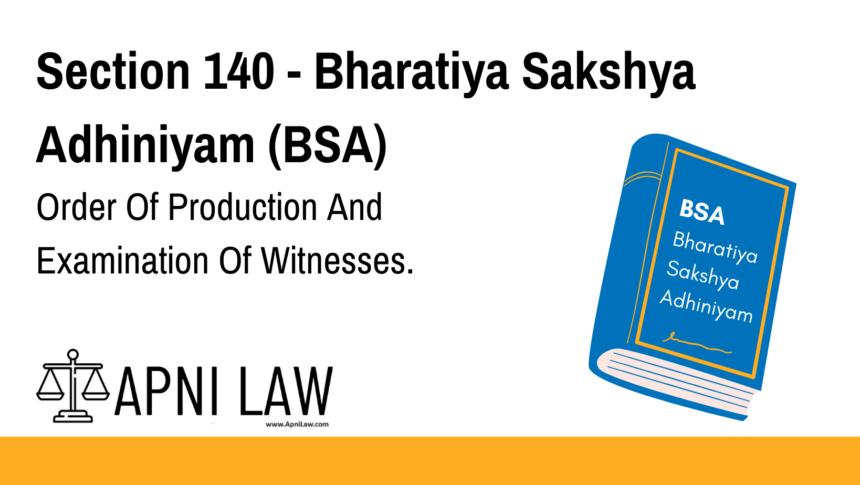Code: Section 140 BSA
The order in which witnesses are produced and examined shall be regulated by
the law and practice for the time being relating to civil and criminal procedure respectively,
and, in the absence of any such law, by the discretion of the Court.
Explanation of Section 140 BSA
Section 140 of the Bharatiya Sakshya Adhiniyam (BSA), 2023, addresses the procedural aspect of witness examination in both civil and criminal trials. It clarifies that the sequence in which witnesses are produced and examined is governed by the procedural laws currently in force.
Where no specific procedural rule exists, the court has the discretion to decide the order in which witnesses may be brought forward and examined. This flexibility allows the court to conduct proceedings in a manner that ensures fairness, clarity, and efficiency.
Key Highlights
- The sequence of calling and examining witnesses follows rules under the Code of Civil Procedure (CPC) and the Bharatiya Nagarik Suraksha Sanhita (BNSS) for civil and criminal cases, respectively.
- In the absence of specific procedural provisions, courts have full discretion.
- The objective is to streamline the trial process while ensuring justice.
Illustration
Example 1: Civil Trial Witness Order
In a civil case related to a property dispute, the plaintiff is typically required to produce their witnesses first, followed by the defendant. This order follows procedural rules under the CPC. However, if required, the court may alter this sequence in the interest of justice.
Example 2: Criminal Trial – Discretion of Court
In a criminal trial, the prosecution usually presents its witnesses before the defense does. However, if a critical witness is unavailable temporarily, the court may allow another witness to be examined out of turn using its discretionary powers under Section 140.
Common Questions and Answers
Q1. Who decides the order of witnesses in a trial?
Primarily, the procedural laws—CPC for civil cases and BNSS for criminal cases—govern the order. However, if no clear procedure exists, the court may decide the order at its discretion.
Q2. Can a court change the witness order?
Yes. The court has the discretion to alter the order of production and examination of witnesses if it deems it necessary for fair adjudication.
Q3. Is there a standard order for witness examination in criminal trials?
Generally, the prosecution produces and examines its witnesses first, followed by the defense. However, Section 140 allows flexibility where needed.
Q4. Does this section apply to both civil and criminal cases?
Yes. Section 140 explicitly refers to both types of proceedings and gives effect to their respective procedural rules.
Q5. Why is discretion important under this section?
Discretion allows the court to handle unique trial circumstances—such as unavailable witnesses, emergencies, or urgent matters—without compromising on justice.
Conclusion
Section 140 of the Bharatiya Sakshya Adhiniyam ensures procedural flexibility in legal proceedings by acknowledging the role of both statutory law and judicial discretion in the order of witness production and examination. It reflects the principle that procedural efficiency must serve the ends of justice, not hinder them.
For more expert commentary and section-wise breakdowns of Indian evidence laws, visit ApniLaw.








